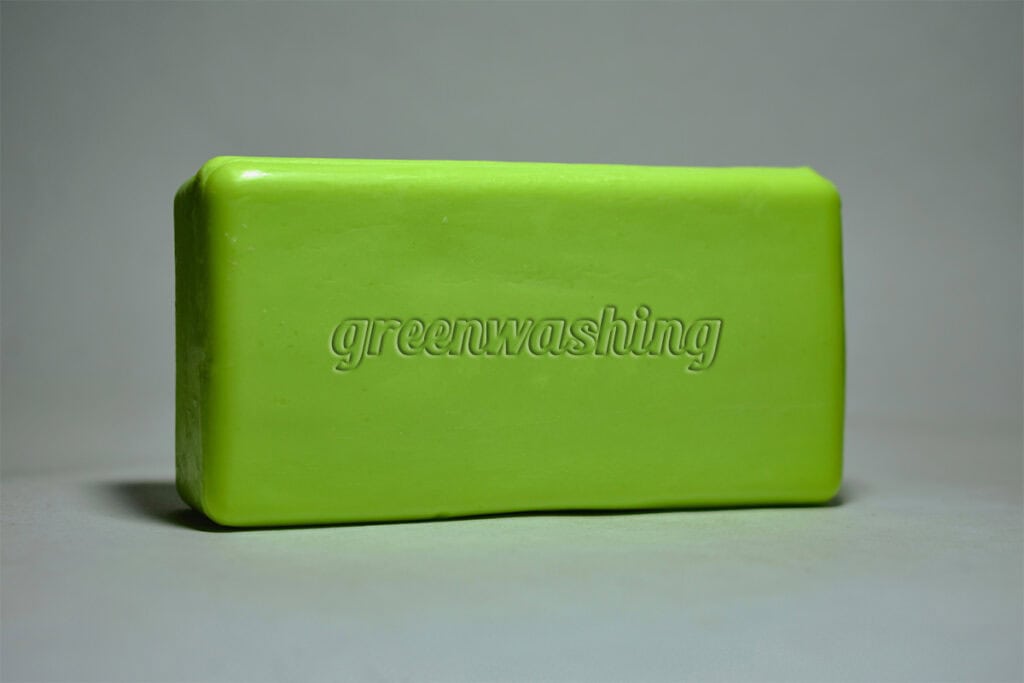
WHAT IS GREENWASHING?
According to Merriam-Webster, the definition of greenwashing is “the act or practice of making a product, policy, activity, etc. appear to be more environmentally friendly or less environmentally damaging than it really is.”
Corporate greenwashing can take on many forms – communications through advertising, packaging, public relations, branding; partnerships or affiliations with other organizations or individuals; and corporate charitable giving. On the flip side, greenwashing can also occur when a company doesn’t communicate, withholding information that would reveal its poor practices.
WHY DO CORPORATIONS GREENWASH?
The answer is simple: The purpose of corporate greenwashing is to mislead the public in the interest of increasing sales and improving or preserving profits.
Clean food and products that are healthy and environmentally sustainable are a quickly growing category of consumer goods, and shoppers will pay higher prices for them. Corporate marketing teams are paid big money to lure these shoppers in. And so, in today’s green marketing practices, almost anything goes. Though there are some consumer protection laws that allow the public to stop misleading marketing, false advertising and misrepresentations abound.
EXAMPLES OF GREENWASHING
We’ll be examining three companies that most people have heard of – Whole Foods Market, Kellogg’s, and Bayer-Monsanto – and walk you through some examples of greenwashing.
Exhibit A: Whole Foods Market: Branding, Public Relations, and Advertising
Whole Foods Market is a retailer that has, since its founding, positioned itself as the premiere grocer for natural and organic foods. It has built this reputation over decades. But especially since its acquisition by Amazon, it has arguably pivoted, relying on a kind of insidious greenwashing rather than maintaining its original standards and living up to its branding and corporate marketing communications.
Whole Foods asserts that it’s the “Organic Capital of the World” and advertises, “We don’t just put organics on a shelf — we put them on a pedestal.” Whole Foods also claims on its website and in its 2023 annual Impact Report that the company’s purpose is “to nourish people and the planet” and “aims to set the standards of excellence for food retailers.” The company claims to “sell the highest quality natural and organic foods and to satisfy and delight its customers.”
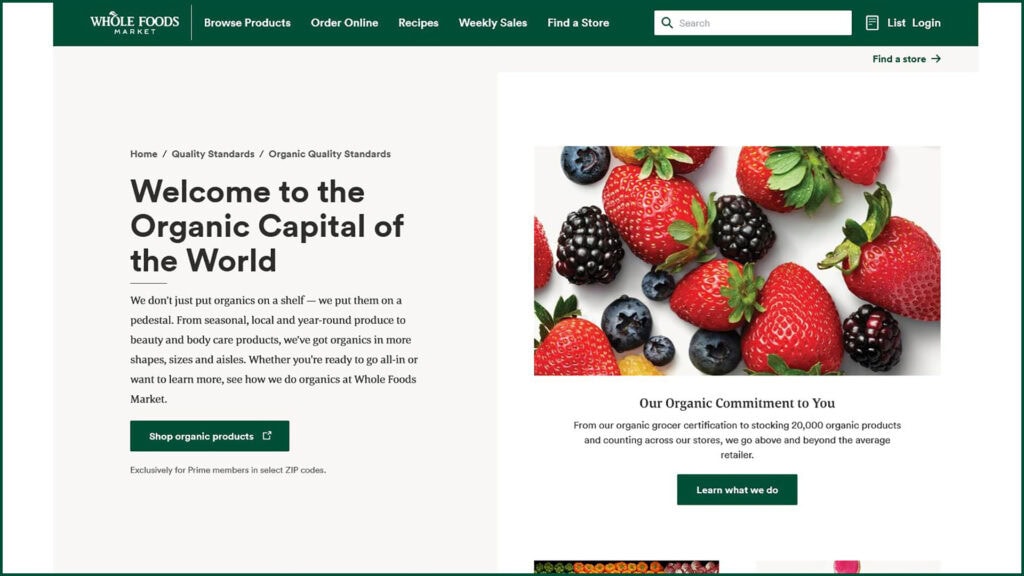
Whole Foods Greenwashing Example #1
This summer, if you trotted into the Whole Foods store in Las Vegas, Nevada, to buy some organic sweet corn for your family BBQ, this is what you found…

Let’s have a look at that sign in the corn bin…

“Treat Your Body and The Earth With Kindness. We support organic farmers and other producers who care about pesticide use and soil health when growing their fruits and vegetables,” the sign says.
You feel so warm and fuzzy. And you shout, “Honey, I found the organic sweet corn!”
Most shoppers would have assumed that the sweet corn in the bin was organic corn, placed the ears in their shopping cart, and rolled away.
But not so fast! You need to take a close look at the sales/UPC label…

While the sweet corn in this bin is not GMO, as indicated – “Does Not Contain any Bioengineered Ingredients” – it’s definitely not organic, as denoted by the fine print stating, “conventional.” Conventional corn is the only corn being sold at this store. Anyone not reading and understanding the fine print has just been duped.
Whole Foods Greenwashing Example #2
Now, let’s hop on over to a store in Avon, Connecticut, where you’ll see this sign hanging prominently above your head.
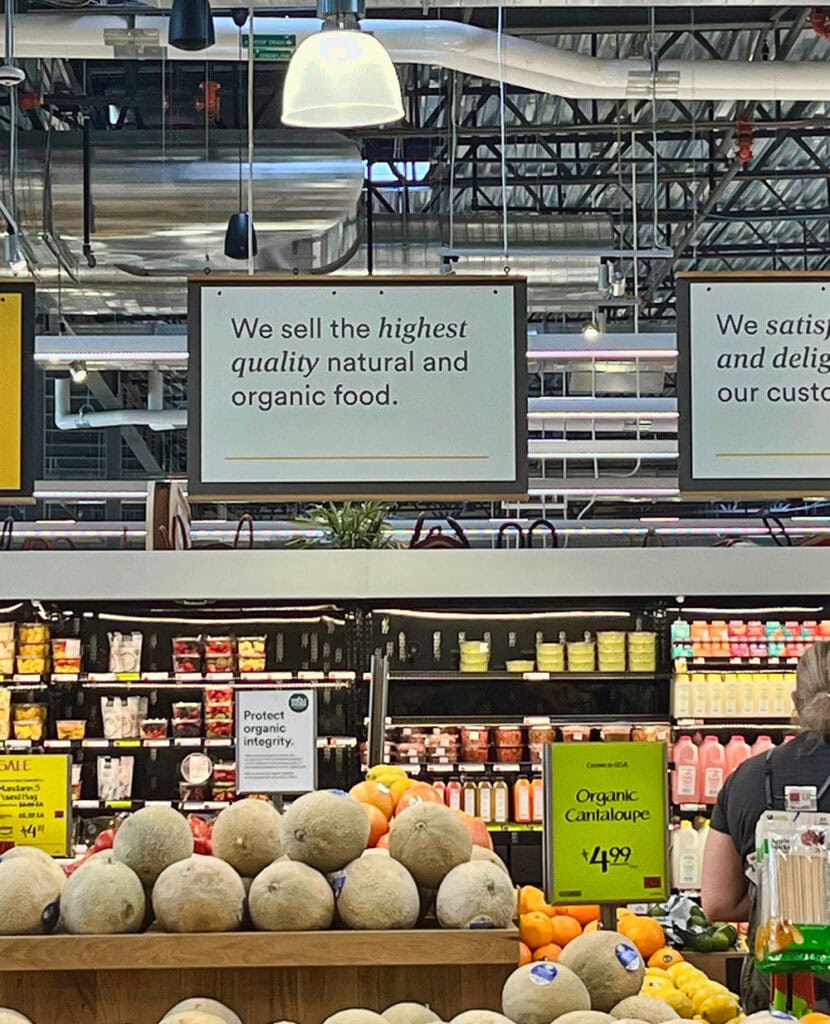
“We sell the highest quality natural and organic food,” the sign says. Organic signs are everywhere. You say, “Great, I’m in the right place!” So let’s go find that organic sweet corn for the BBQ.

Found the sweet corn… but again, if you read the fine print, which most people wouldn’t, you’ll see it says, “Bioengineered Food.” This is the new term concocted by the GMO industry and the USDA that means GMO, but one that most consumers aren’t yet familiar with.
Shockingly, in this Avon, Connecticut, store, this is the only sweet corn available. No organic. Not even conventional, non-GMO corn. The only corn featured here is toxic, insecticide-producing, herbicide-tolerant GMO corn that was created in a lab. GMO corn is not natural.
How is this putting “organics… on a pedestal” as Whole Foods so proudly claims?
Whole Foods Greenwashing Example #3
Go West, young man.
Don’t mind if we do. Let’s head over to the Evergreen State and find some sweet corn for our BBQ.

In this Redmond, Washington, Whole Foods store, we actually have two options.
The bin on the left contains “Organic Bi-Color Corn.” The bin on the right contains “Bi-Color Corn.” Whole Foods shoppers have already been conditioned by advertising, corporate branding, and in-store signage to expect only natural and organic foods.
But again, look very closely at the sign on the right and there is a tiny disclosure that the corn is “bioengineered.” If you’ve already forgotten, bioengineered means genetically engineered, or GMO.

A person with poor eyesight (like the author of this article) wouldn’t even be able to read the tiny “bioengineered” disclosure on the signage. If Whole Foods was transparent and forthright, the sign in that bin should read, “GMO Bi-Color Corn,” in large letters, treated in the same way as the Organic Bi-Color Corn sign.
Surprisingly, Whole Foods was selling the GMO sweet corn at prices even higher than non-GMO sweet corn sold at Walmart. Organic foods tend to be the most expensive, followed by non-GMO foods. GMO foods, which are highly subsidized by taxpayers in the U.S, are cheapest. Price-conscious Whole Foods shoppers may decide to buy conventional over organic, but they wouldn’t expect the conventional produce to be GMO.
Bait and switch: Before its acquisition by Amazon and as an independent company, Whole Foods would have never carried fresh produce that is genetically engineered, as its long-time customers and target market would have found this inappropriate and objectionable.
In the past, Whole Foods’ nickname, “Whole Paycheck,” was tenable because of the company’s commitment to certified organic foods. But Whole Paycheck for GMO foods is greenwashing.
Exhibit B: Kellogg’s: Packaging and Partnerships/Affiliations
Kellogg’s has recently broken into two separate companies, Kellanova and Kellogg. But we’ll refer to them as Kellogg’s in this article.
Kellogg’s Greenwashing Example #1
“Healthwashing” isn’t yet a word, so we’ve decided to include examples of this as a subcategory of greenwashing.
No person on Earth should be even remotely convinced that Kellogg’s Froot Loops cereal is healthy. Yet, some people would be led to believe that this ultra-processed junk food has some redeeming characteristics by what’s printed on the box.
The packaging says, “Good Source of FIBER & Made with WHOLE GRAIN.” All caps. Wow, there must be a LOT of fiber and whole grains in there. And “Natural Fruit Flavors”, too. Kellogg’s advertising of Froot Loops also says, “Start your day on the right foot with breakfast cereal bursting with fruity flavor, delicious for kids and adults.”
If you look at the ingredients list, you’ll see the product is primarily made of sugar and the bright colors created using artificial, petroleum-based food dyes. This, and most of Kellogg’s cereals targeting children, are far from natural or healthy, so much so that the government of Mexico has enacted food packaging regulations forcing manufacturers to put front-of-package warning labels to educate consumers about things like excess sugar and fat. Mexico has also banned the use of mascots like Toucan Sam and Tony the Tiger for unhealthy junk food.
But instead of making healthier food, Kellogg’s has sued the Mexican government and launched a propaganda campaign to turn the Mexican public against the labeling policy. All while our own FDA says that foods with more than 2.5g of added sugar are “not healthy,” but no disclosure is required. Froot Loops contains 12g of added sugar!
Kellogg’s Greenwashing Example #2
Using actors and athletes to sell junk food is nothing new. But it’s still an effective form of greenwashing. If those actors and sports figures look so beautiful and healthy, it must be the food, right?
Below, we have dancer and actor, Allison Holker, hawking Frosted Mini-Wheats. Just like the Froot Loops box, Holker is pitching the fiber content. But what she doesn’t say is that Frosted Mini-Wheats contains an unhealthy amount of sugar, likely genetically engineered, and is made of conventional wheat, likely desiccated with the toxic herbicide glyphosate.
For the record, our own Food and Drug Administration (FDA) will tell you that Kellogg’s Frosted Mini Wheats are “not healthy.” The product contains 12g of added sugar, well above the FDA’s healthy cutoff level of 2.5g.
Holker says, “Just add milk and fruit.” Really? You’re better off eating only the fruit and dropping that box of Frosted Mini-Wheats into the trash can.
In more recent years, however, as consumers become more health conscious, Kellogg’s and other food corporations have resorted to even more egregious forms of greenwashing – paying registered dietitians to hawk their junk food. You would think registered dietitians would have some code of ethics. Not so. There are some that have no ethics whatsoever, as we’ll see.
Below is a sponsored message on Facebook by Kaleigh McMordie, Registered Dietitian Nutritionist (RDN) and founder of the website Lively Table, which purports to give its readers “no-BS nutrition, wellness and healthy living tips.”
McMordie is singing the praises of fiber in Raisin Bran. Fiber is important, but the dietitian fails to tell you that Raisin Bran is also high in added sugar, likely genetically engineered, and is made from conventional wheat, likely desiccated with glyphosate.
Yet another example of bought-and-paid-for greenwashing by a Registered Dietitian Nutritionist who calls herself Dietitian Deanna. Again, Frosted Mini-Wheats. Again, trash can. These people are shameless.
Kellogg’s Greenwashing Example #3
In 2020, Kellogg’s announced a commitment to phase out the use of glyphosate as a pre-harvest drying agent in its major wheat and oat supply chains by 2025.
Pre-harvest drying, also called desiccation, of crops with chemical herbicides such as glyphosate is a common practice among conventional farmers. Although GMO wheat and oats are not currently used in the United States, the practice of desiccation has resulted in even higher levels of glyphosate being found in these non-GMO crops than in glyphosate-tolerant GMO crops like corn and soy.
So Kellogg’s announcement to phase out the practice of glyphosate desiccation in their supply chains was not only welcome, it was lauded and promoted with much positive publicity. News stories characterized the corporation as a “leader” in its field, putting a halo on the company’s head for its effort to protect human health and the environment. All of this positive publicity was free advertising for Kellogg’s, something called “earned media” in the marketing field.
Unfortunately, it was all a big lie. Kellogg’s did absolutely nothing since 2020 and as of the writing of this article, has backtracked on its commitment.
This is often the case with big, multinational corporations. They’ll make a big splash with a promise to do something good. They’ll reap the publicity rewards of that announcement, but setting a date far into the future. When the time comes, they renege on the original promise, as Kellogg’s has done. After so many years have passed, most people forget there was even a promise made. So Kellogg’s experiences no consequences.
But at GMO/Toxin Free USA, we don’t forget. Which is why we continue to call for a boycott of Kellogg/Kellanova. It’s still the same lying, greenwashing corporation it was no matter what name it goes by.
Exhibit C: Bayer-Monsanto: Public Relations and Charitable Giving
Monsanto was arguably the most hated corporation in the world before being acquired by Bayer AG in 2018. Though Bayer is most associated with relieving people’s headaches with its aspirin pills, the company also has a very dark underbelly. Both companies’ public relations departments had, and still have, their work cut out for them. As a combined company, Bayer-Monsanto uses the same tactics to minimize public criticism and deflect attention away from its harmful products.
Bayer-Monsanto’s greenwashing list is very long. So we’ll only cover a couple of examples.
Bayer Greenwashing Example #1
This summer, Bayer launched a Monarch butterfly campaign with a local Hawaii organization dedicated to butterflies.

Bayer’s website announcement reads, “To raise awareness about the importance of monarch butterflies in agriculture, Bayer Hawaii is partnering again with Sharing the Butterfly Experience for its 6th annual Monarch Butterfly Kit giveaway.”
“Since 2018, we’ve been able to give away more than 75 monarch butterfly kits across Hawaii. Not only does this create a memorable and educational experience for the winners, it helps raise awareness for the critical role pollinators play in our world, specifically in our food supply,” said Monica Ivey, corporate relations lead for Bayer Hawaii. “It’s a privilege to help others experience these beautiful and extremely valuable creatures while supporting their conservation.”
This is probably one of the most egregious forms of greenwashing.
What Bayer-Monsanto doesn’t tell you is that they produce neonicotinoids and glyphosate/Roundup, pesticides widely used in conventional and GMO agriculture. These are products that kill the Monarch butterflies and other important pollinators. Bayer’s pesticides are one of the major causes of the mass biodiversity and species loss of our modern times.
To add insult to injury, Bayer has operations in Hawaii where the company experiments with GMO seeds and toxic pesticide concoctions, poisoning Hawaiians and their land.
Some of you may be aware of these facts. But right now, most people in the world are not. So for Bayer, this exercise in greenwashing is still effective and low-cost.
Bayer Greenwashing Example #2
The Bayer Fund is the corporation’s charitable giving arm. Corporate charitable giving has long been used for multiple reasons. Sometimes to improve public perception – being a good “corporate citizen.” Sometimes to silence potential criticism.

Bayer’s giving is not philanthropy, even though the company publicly states it as such. Bayer strategically doles out millions in cash to nonprofits to help it achieve its corporate goals. Bayer’s primary goal: To make billions and ever-increasing profits for shareholders.
The Bayer Fund website states: “Bayer is committed to improving the quality of life for people around the world. Equally important is our commitment to substantially and meaningfully improving people’s lives in the communities in which we and our customers live and work. As a philanthropic arm of Bayer in the United States, Bayer Fund develops programs and makes strategic investments to qualified non-profit organizations tackling big challenges – combating malnutrition and food insecurity; enhancing STEM (Science, Technology, Engineering and Math) education; providing support services for patients and families managing cardiovascular disease and cancer.”
That statement really is a sick joke. Bayer poisons people around the world. Is poisoning the people and lands of Hawaii “meaningfully improving people’s lives in the communities in which we and our customers live and work”? No, it’s quite the opposite.
A major and influential nonprofit that Bayer gives to is Susan G. Komen. Komen popularized the pink cancer ribbon and the “Walk/Race for the Cure” and its mission is “to save lives by meeting the most critical needs in our communities and investing in breakthrough research to prevent and cure breast cancer.”
Monsanto was also a corporate sponsor of Komen when it was an independent company. In 2013, Monsanto representatives were handing out Monsanto-branded bandaids during a Komen Walk for the Cure in St. Louis.
Monsanto makes Roundup. Roundup causes cancer. Bandaids will not help your cancer. You just can’t make this stuff up.
You would think an organization like Komen would emphasize cancer prevention. Yet, you’ll be hard-pressed to find much about the risks of toxic pesticides or the roles chemicals can play in causing cancer on the Komen website. In fact, Komen regularly downplays the risks posed by pesticides. Is this a coincidence?
But the truth is beginning to catch up to Bayer-Monsanto and the nonprofits that conceal or minimize the dangers of synthetic pesticides. Bayer has been sued by over 130,000 individuals in the U.S. alleging their Non-Hodgkin Lymphoma was caused by Roundup weedkiller. The science supports these claims and so have juries. Bayer has lost multiple trials since 2018, costing the company billions. And there are tens of thousands of trials to go.
How to Spot Greenwashing
There are so many examples of greenwashing that it would be impossible to give an exhaustive list. But here are some tips…
We can all appreciate great design, but don’t be taken in by fancy packaging, or graphics or photos that adorn those packages. That goes for the words printed on the packaging, too. Some words have meaning, most don’t.
Take words such as “simple,” “clean,” “natural,” “all-natural,” “100% natural,” “eco-friendly,” “green,” “sustainable,” “biodegradable,” and “plant-based” with a grain of salt. These words are not regulated and can be misleading. Even words like “non-toxic” and “hypoallergenic” can be used freely.
Beware when a company claims their food/product is “free of…” For example, many non-stick, Teflon-coated cookware makers regularly tout their products as “Free of PFOS” or “Free of PFOA,” two toxic PFAS-class chemicals. But what they don’t tell you is that Teflon contains PTFE, which is also a PFAS-class chemical.
Also beware of made-up logos and seals intended to fool you into thinking the product has been certified by a trustworthy certifying body.
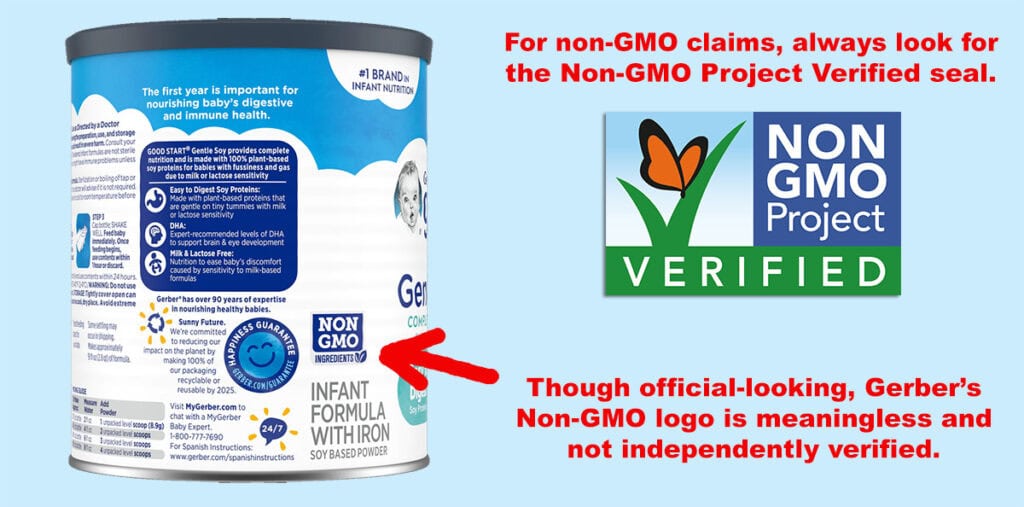
How to Avoid Greenwashing
Not every company is out to rip you off. But we always like to say, “Trust, but verify.”
If you’re shopping for fresh food at the farmers market, you may know the farmer. Maybe you’ve even been able to visit the farm and see that the barn in the farm business’s logo actually exists. And that they’re not spraying pesticides everywhere. That the chickens are actually outside, pecking and scratching at the soil and having a good ‘ol time.
But if you’re shopping in the wild wild west of the supermarket, that’s not possible. Especially for processed foods and consumer products, which are made in factories that may not even be in the state or country in which you live.
The only way to verify is to look for official third-party certifications. This is the surest way to avoid greenwashing and have an assurance that a company’s advertising claims are merited. So learn the labels and do the best you can.
We’ve pictured some of the most trustworthy certifications below, covering food, consumer products, and textiles. The graphic is not an exhaustive list.
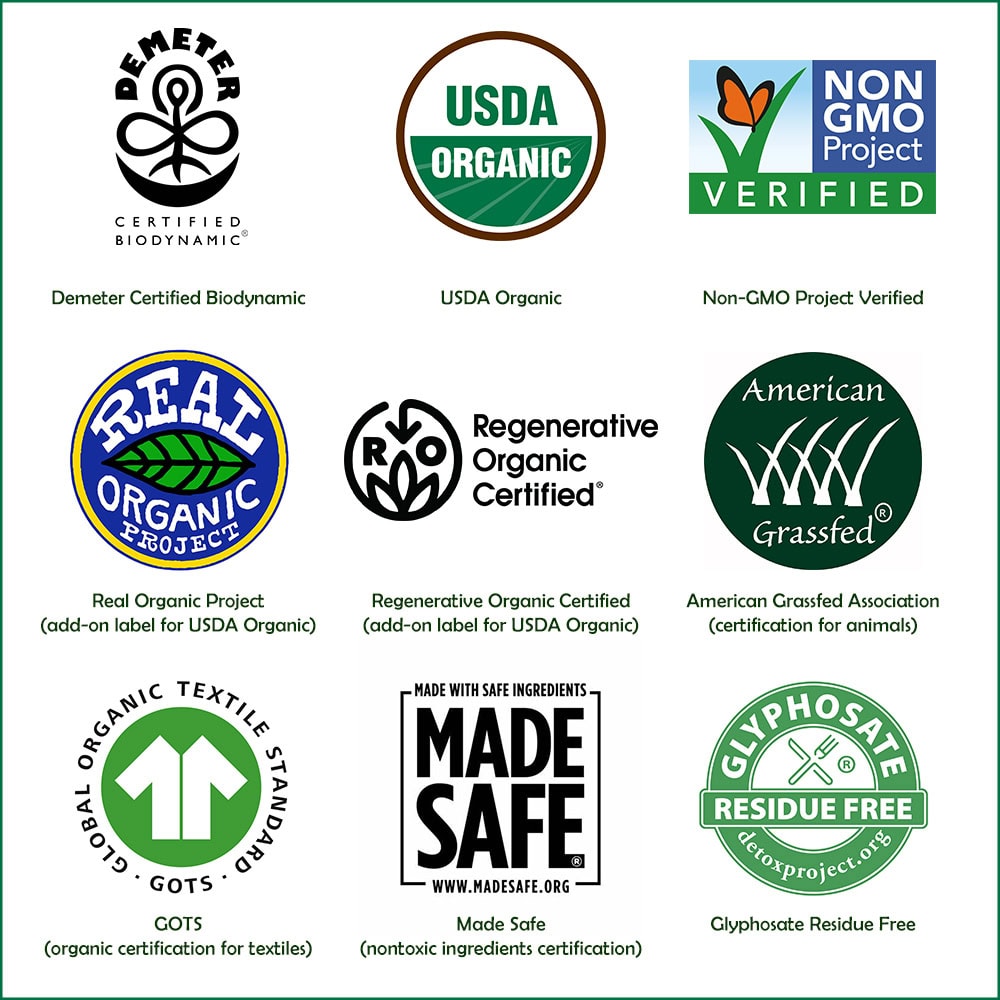
P.S. We’ll be writing a more comprehensive blog about food/product certifications and what you can expect from those labels, as a companion to this greenwashing blog… coming soon. Sign up for our emails to be the first to read it. SIGN UP HERE.
Have you spotted greenwashing in the stores or online? Let us know in the comments below!

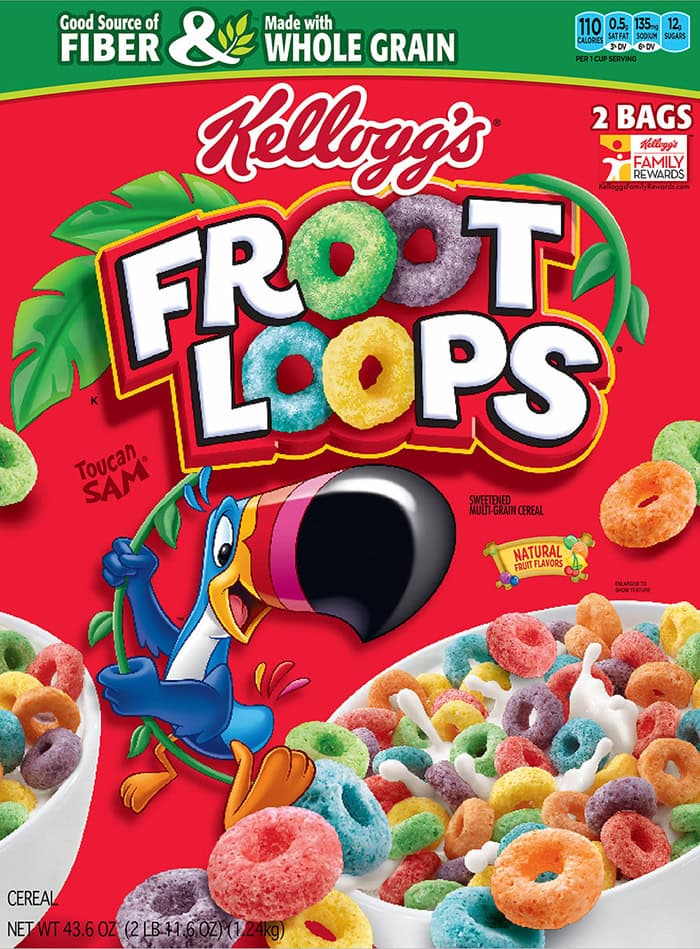


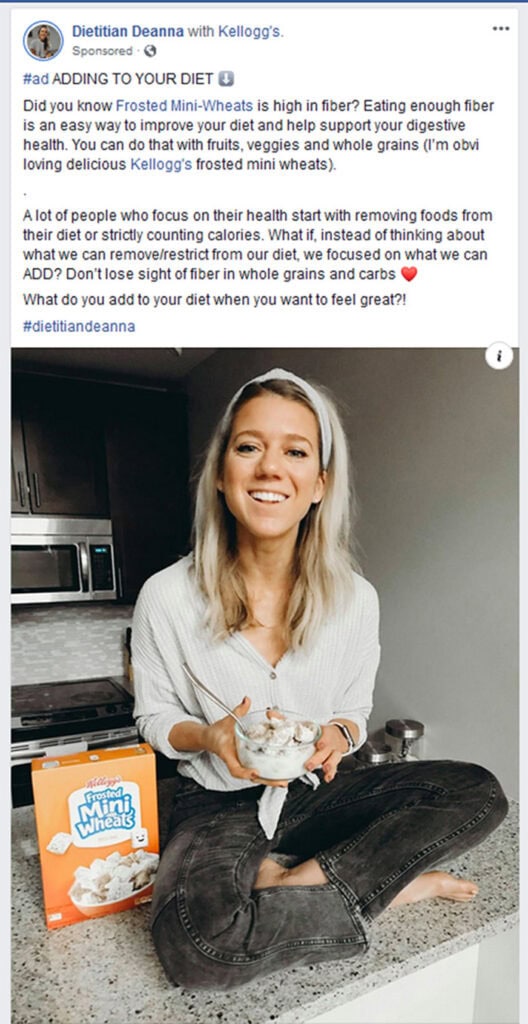
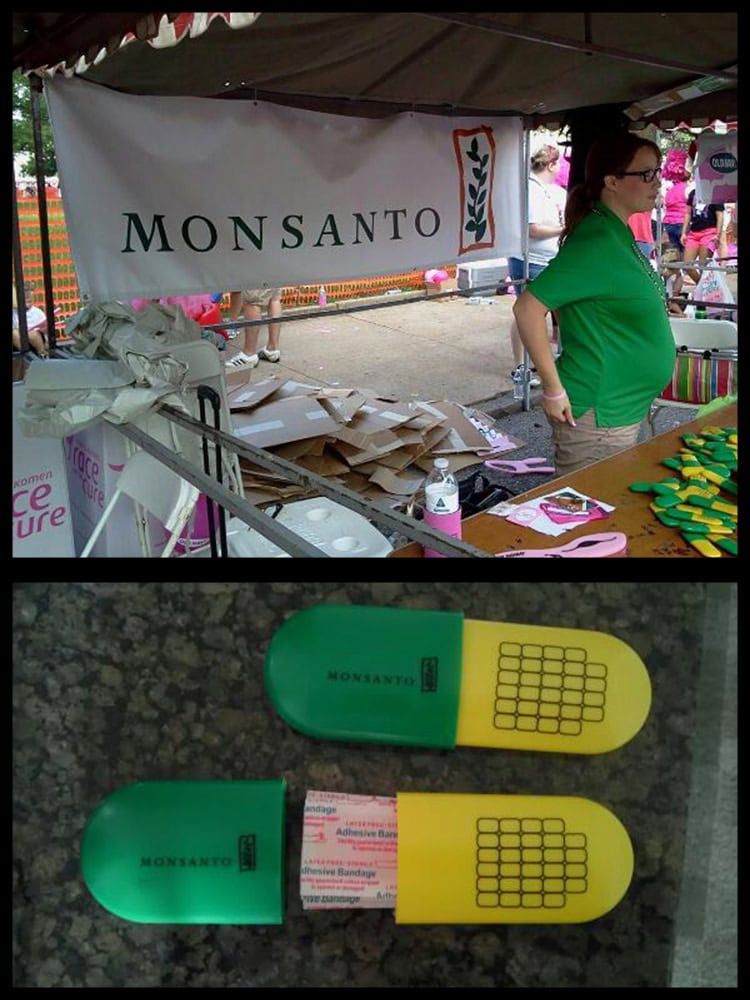

This is grand deception, also known as lying and deceit in advertising. Sadly, in these cases the perpetrators are compromising public health to increase their profit margin. Consumers have to be careful to read labels and look for yhat trustworthy certification as pictures. The maddening part of this is the retail markets are oftentimes complicit in the deception. They’re all trying to jump on the green bandwagon to grow their profit margin and therefor are just as much a threat to consumer health as Kelloggs, Bayer-Monsanto, i.e. Whole Foods among so many other retailers. Where is “Truth in Advertising”?
Why isn’t the FDA more directly involved? Seems like everything is up for grabs with no control.
US federal agencies are limited by their enabling laws and appropriated budgets. Because the budgets rarely fund the entire mandates, leadership tells the staff what to prioritize. In addition, the courts have been ruling against the regulatory authorities of Executive Branch agencies. Our best remedies are to raise awareness, vote in elections, lobby our elected officials, and write to the Executive Branch agencies during public comment periods.
Thanks for your article’s on this
As a chef, restaurant owner & caterer, I’ve been in the industry for well over 40 years with an organic regenerative food lifestyle reflecting my work. I’ve noticed canola oil, soybean oil & other vegetable oils in many of the frozen food products in Trader Joes, Sprouts, Whole Foods, etc. People please read your label before you purchase for your table.
Excellent article however I would note that label GMO is the result of greenwashing too! The industry was having real problems when their sh*t was called “genetically engineered”. Sadly nearly everyone has internalized this bit of deception and does the biotech industry a favor by calling it genetically modified.
Growing up on an organic farm in CA, and living a healthy organic lifestyle into my mid-80s, label-reading is indeed essential. Also totally staying out of Whole Foods Markets, avoiding Kellogg’s products and anything related to Bayer-Monsanto is one strategy my family uses to be as healthy as possible.
I agree with everything in your article. I am careful about reading labels and try not to buy much in the processed food line, though I do buy bread, mayonnaise, and some stuff like that. However, until and unless you and others start to acknowledge geoengineering and the fact that everything is now sprayed with toxins from the skies in the pursuit of dimming the sun and cooling the earth, there is little chance that anything is healthful anymore. I buy fresh vegetables that now rot from the inside out. Black, slimy lettuce, celery that’s brown and mushy, onions that rot in little time. Something must be done about the aluminum and plastic nano particles along with barium and strontium that are being unleashed on the earth.
When the non-GMO Project came out with its verification, I feared what then soon was happening: It contributed to the confusion among consumers. Most still think, “well, it’s non-GMO verified, so it must be toxin free and safe.” It isn’t necessarily so. Agricultural chemicals can still make it on your produce, fruit, grains etc. This is esp. true for processed foods where even GMO ingredients can easily get hidden and aren’t required to be disclosed on the label. With this label, people are poisoning themselves while they trust their food choices. So, in my view, the Non-GMO verified label is another greenwashing scam, and always has been.
I live near the Amish..they grow tobacco abd spray it with Roundup!
They est more “processed ” food & Cancer is increasing in The Amish…they do grow their fruit & vegetables organic…meats organic raised
Non GMO verification doesn’t mean the food doesn’t contain agricultural chemicals/toxins or even ‘small amounts’ of GMO ingredients.
In my view, Non-GMO verification doesn’t help the actual natural food movement nor the consumer.
It’s another kind of greenwashing…
We all need to remember ” we are what we eat. ” Reading labels is necessary when shopping.